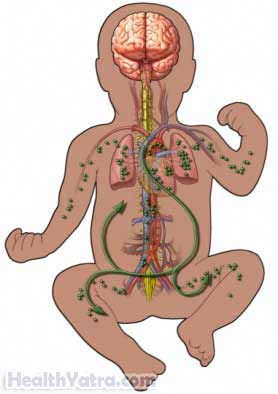সংজ্ঞা
Neonatal sepsis is a bacterial infection in the blood. It is found in infants during the first month of life. This may become a serious condition. If you suspect your infant has this condition, contact your doctor right away.

Early onset sepsis develops in the first 2-3 days after birth. Late onset sepsis develops within 3-7 days after birth.
কারণসমূহ
Neonatal sepsis is caused by bacteria. The infant may come in contact with bacteria during pregnancy, birth, or from the environment after birth.
Early onset sepsis is caused by an infection from the mother. It may pass to the infant from the placenta or birth canal during birth. Antibiotics may be given to high risk mothers, during labor. They have been able to prevent early onset bacterial sepsis in some infants.
Late onset sepsis is caused by bacteria from the caregiving environment.
ঝুঁকির কারণ
The following factors increase your infant’s chance of developing neonatal sepsis:
- Premature birth—more than three weeks before due date
- Early labor—more than three weeks before your due date
- Infant is in distress before being born
- Infant has a very low birth weight
- Infant has a bowel movement before being born and fetal stool is in the uterus
- Amniotic fluid surrounding the infant has a bad smell or the infant has a bad smell right after being born
- Male babies have a greater risk for neonatal sepsis than female babies
Pregnancy conditions or mother’s health issues that increase your infant’s chance of sepsis include:
- Labor complications resulting in traumatic or premature delivery
- Water that broke more than 18 hours before giving birth
- Fever or other infections while you are in labor
- Need for a catheter for a long time while you are pregnant
- Presence of group B streptococcal bacteria in vaginal or rectal areas
- Many courses of prenatal steroids
- Prolonged internal monitoring during labor and delivery
লক্ষণ
In most cases of early onset sepsis, symptoms are present within 24 hours of birth. In almost all cases, symptoms will be present within 48 hours of birth. If your infant has any one of these symptoms, especially in first week, contact your doctor.
- Fever or frequent changes in temperature
- Breathing rapidly, difficulty breathing, or periods of no breathing (apnea)
- Lethargy (abnormal sleepiness)
- Poor feeding from breast or bottle
- Decreased or absent urination
- Bloated abdomen
- Vomiting yellowish material
- ডায়রিয়া
- Extreme redness around the belly button
- চামড়া লাল লাল ফুসকুড়ি
- Difficulty waking your infant or unusual sleepiness
- Jaundiced or overly pale skin
- Abnormally slow or fast heartbeat
- Bruising or bleeding
- খিঁচুনি
- Cool, clammy skin
It is important for your doctor to evaluate any fever in your infant.
রোগ নির্ণয়
Your doctor will ask about your infant’s symptoms and medical history. A physical exam will be done.
পরীক্ষায় নিম্নলিখিতগুলি অন্তর্ভুক্ত থাকতে পারে:
- Blood tests such as complete blood count
- Cultures of:
- রক্ত
- প্রস্রাব
- Cerebrospinal fluid—through spinal tap
- Skin lesions
- X-rays of the chest or abdomen
চিকিৎসা
Talk with your doctor about the best treatment plan for your infant. Treatment depends on how severe the condition is. If sepsis is suspected, your infant will be hospitalized while you wait for test results.
Treatment may last 2-21 days. A well-appearing infant may be monitored without antibiotics. Your infant will be sent home when tests show there are no bacteria. Sepsis that is confirmed with a culture test is treated for 7-21 days. Treatment will depend on the location of the infection. Treatment options include antibiotics and support care like oxygen or IV fluids.
অ্যান্টিবায়োটিক
Antibiotic medicine may have to be given directly into the vein (IV).
Intravenous Fluids
IV fluids will help support your infant until the infection clears. It may include fluids, glucose, and electrolytes.
অক্সিজেন
Your infant may need oxygen therapy. In more severe cases, a ventilator may be used to support breathing.
প্রতিরোধ
To reduce your infant’s chance of getting neonatal sepsis, your doctor may take the following steps:
- Antibiotics can control dangerous bacteria in the mother. It will prevent the spread of bacteria during pregnancy or birth to the infant. Your doctor may recommend antibiotics if:
- The birth mother has previously given birth to an infant with neonatal sepsis.
- You have had a positive bacterial infection test before your due date.
- Breastfeeding may also help prevent sepsis in some infants.
- Follow steps to prevent premature labor or birth. This can include proper prenatal care, avoiding drugs and alcohol, and eating a healthy balanced diet.
